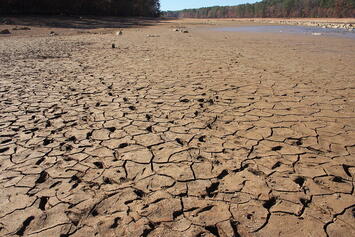
It may be the least opportune time of the year to bring it up, but climate change is something we in Flyover Country are finally reckoning with. And even as the thermometer this week plunges to its lowest levels of the season in much of the heartland, longer-term forces are going to prevail on the issue of our climate, just as spring follows winter.
For the record, I remain agnostic about whether the perceived craziness in meteorological phenomena these days is the result of true, epochal climate change; just a long bout of what we used to call “bad weather”; or something in between. And no doubt our perceptions are being shaped significantly by the climate-disaster narrative that has been embraced by the media, academia, most of government and much of business.
But to some degree, it doesn’t really matter what I or anyone else actually believes about what is happening with the climate, or at least with the weather: The horse, as we say in rural Flyover Country, already has left the barn. Not only are the realities and perceptions about climate change shaping political dialogue – they’re also beginning to shape the responses of our economic actors, from farmers to Realtors to car companies.
More about that in a minute.
Reshaping Has Begun
Unfortunately, a lot of activity around the climate-change issue is worthless or, at worst, counterproductive.
One recent example was how media pundits interpreted the disastrous, long-track tornadoes that pummeled Illinois, Kentucky and adjacent states on December 10. Rescuers were only starting to reach those suffering or dead in piles of debris when some media pundits already were pontificating that the once-in-a-century onslaught of twisters was the evil result of global warming. And, implicitly, their message was: So what are you going to do about it?
But such irresponsible climate mongering doesn’t negate the fact that reactions to weather or climate changes so far, and anticipation of further changes, are beginning to reshape our economy here in the American heartland.
Consider agriculture. Meat and dairy farmers and processors have become Public Enemy No. 1 to environmental activists who, essentially, want to ban the production of animal proteins on which much of the economy of the heartland depends. While there remains a lot of debate about how much animal methane emissions actually contribute to the global total, the dubious progressive narrative is that plant-based products not only are more “sustainable” but also healthier.
The Weight of Water
At the same time, our prospects around water look better. The apparent likelihood of longer growing seasons is creating hopeful new considerations on farms in Flyover Country about crop choices and rotations. Our situation in a region anchored by the Great Lakes, and helped by conservative water management across the heartland, is much better than in the American West.
Even last summer’s drought, which whacked wheat crops in the Great Plains, and the ongoing depletion of the region’s underlying Ogallala Aquifer, seem manageable compared with what’s going on elsewhere. Farmers’ more aggressive water-conservation measures are one thing that is helping.
By contrast, take California, where irresponsible stewardship of water has combined with record drought over the last several years to produce not only tremendous current economic thirsts but also great concerns about the future and about how much water shortages could come to crimp growth. Vast swaths of acreage now devoted to water-thirsty produce like almonds – products that have helped revolutionize the American diet – are threatened, and so are the state’s many industrial uses of water. Not to mention watering the sea lavender and taking showers.
Also consider the rising seas that, according to the consensus of current climate science, will be lapping at Atlantic and Pacific shores in no time. You don’t have to think the 2004 movie The Day After Tomorrow was prophetic to believe that certain coastal real estate may be threatened at some point and that, for much of it, little can be done to retain its current value.
Would this development open doors for climate-danger comparative sales of homes and plots in places like Little Rock, Arkansas (335 feet above sea level); Akron, Ohio (1,004 feet); or Bemidji, Minnesota (1,365 feet)?
Read the rest of this piece at Flyover Coalition.
Dale Buss is founder and executive director of The Flyover Coalition, a not-for-profit organization aimed at helping revitalize and promote the economy, companies and people of the region between the Appalachians and Rockies, the Gulf Coast and the Great Lakes. He is a long-time author, journalist, and magazine and newspaper editor, and contributor to Chief Executive, Forbes, the Wall Street Journal, the New York Times and many other publications. Buss is a Wisconsin native who lives in Michigan and has also lived in Texas, Pennsylvania and Florida.
Photo: ACES/Bruce Dupree via Flickr in Public Domain.












